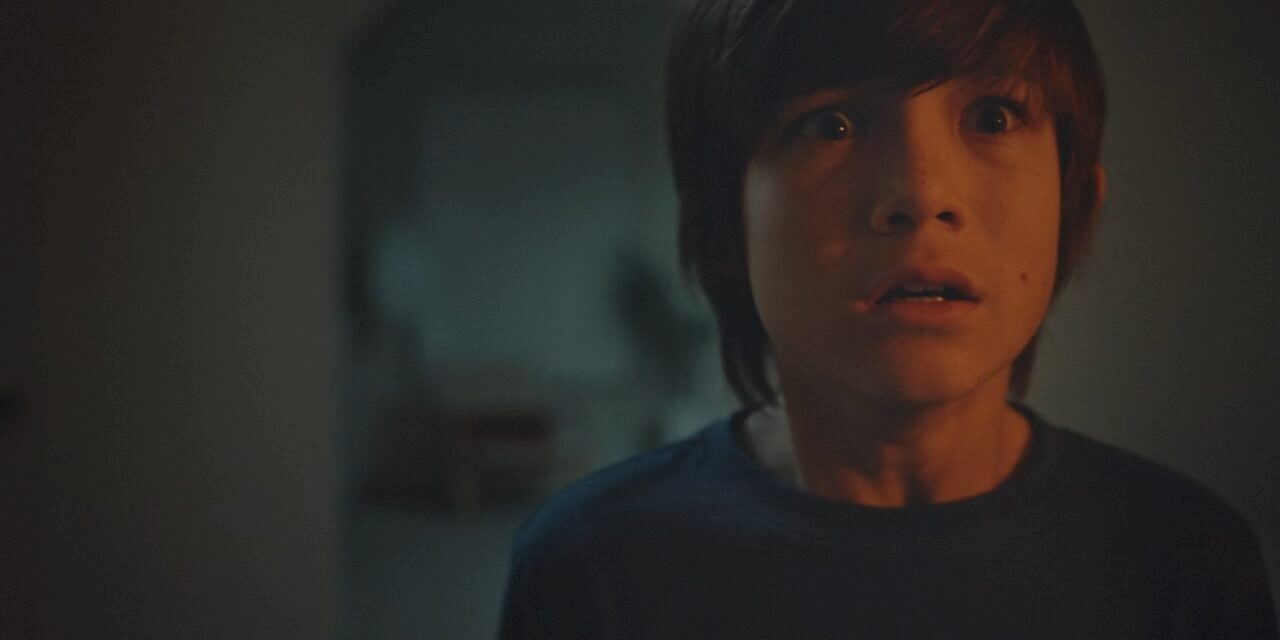What to Watch Verdict
'The Djinn' evokes fear on the basest level of horror architecture, only needing a shapeshifting wishmaster and Ezra Dewey's anything but muted performance.
Pros
- +
🥡 Ezra Dewey shoulders his load.
- +
🥡 Nothing fancy, always focused.
- +
🥡 "The Djinn Grin" is a mean one.
Cons
- -
🥡 Again, nothing fancy.
- -
🥡 Familiar horror tropes.
- -
🥡 Not much to learn about the titular Djinn.
Intermediary horror like The Djinn is essential to the overall horror kingdom. Not everyone can play Doom on "Nightmare" out the gate, as an analogy. Filmmakers David Charbonier and Justin Powell boil horror down to its "monster under the bed" roots with an adolescent focus. As an underage youth, is there anything scarier than a dark closet? Boy finds "Book Of Shadows," boy uses incantation to summon supernatural wish-giver, boy finds out bargaining your soul comes with consequences—and you know what? In the vein of 2012's Under The Bed and 2020's The Wretched, it's enough. For basic introductions into more vicious nightshades of genre difficulty, The Djinn flips its pages like one of Lucifer's bedtime fables.
During an overnight defense, the film centers itself as mute child Dylan (Ezra Dewey) staves off the advances of a conjured Djinn. It starts when Dylan asks the entity for the ability to speak after following strict instructions from the "Book Of Shadows" (found in his new apartment). Father Rob (Rob Brownstein) is pulling a late-night shift at his radio station, which leaves Dylan petrified and alone. The Djinn traps Dylan within an invisible force field inside the apartment boundaries, leaving only one option—survive the monster's feral attacks until after midnight, then extinguish his vitality candle for your wish to be granted.
Welcome to The Djinn, a streamlined hunter-stalker restricted to an empty housing unit that relies on sound design through scoring since Dylan communicates using sign language. It's predominantly Dylan's showcase since Rob splits for DJ'ing after Chinese takeout is finished, which leaves relative newcomer Ezra Dewey to shoulder every emotional and physical beat like a champ. A tall order for a short-stack lead, but Dewey remains appropriately panicked and reluctantly heroic as a vanquisher of manipulative genies who's still wearing his pajamas. Charbonier and Powell take an incalculable gamble by relying almost solely on a child actor—Dewey silences any doubt once the underworld weaponizes the foolishness of his character's pure intentions.
Starring opposite Dewey is a trio of Djinn forms outside the jet-back lurker in its fanged, slender demon physique, as one of the creature's signature tricks is adopting fleshy camouflages based on photographic portraits. Be that a convicted criminal, the apartment's deceased owner (a nod that the Djinn may have enjoyed playtime prior), or Dylan's mother, deceased after her suicide. At first, only as an older homebody or incarcerated inmate in human presentation. Then? Charbonier and Powell's special effects team morph the image of Dylan's maternal ghost, immortalized during empathetic flashbacks in a flowy nightgown, with milky white eyes and Mileena from Mortal Kombat chompers. Camera mobility maximizes frightening pursuits as the crooked grin shoots around a kitchen corner, or a shriek initializes another frantic dart towards the heavily-panting Dylan.
That's it, frankly. In ways, a direct correlation to The Vigil via construction but without the immense traditional investment that makes the haunting Jewish standout—well—stand out.
With folkloric dedication above "Baby's First Spellcasting," The Djinn could resemble something vastly more dynamic. As is, Dylan's stumbling upon the "Book Of Shadows" like some discarded library rental with a pentagram opens right to a Djinn page as read by Rob's voice (a sweet note since Dylan's never heard his own words). Candles flicker, finger pricks squirt blood, and then a standoff engages like countless other unholy standoffs have been fought. Julián Estrada's cinematography shoots best when trailing the Djinn's elusive swirl of smoky, mystical mistiness that nails the storybook vanity of the Djinn's entrances. Otherwise, it's a lot of Dylan whacking the Djinn with a porcelain toilet cover or locking the Djinn in random storage areas. The beast endures earthly pain, messages about appreciating what gifts we're given take shape, yadda yadda—inevitable conclusion.
The Djinn is formulaically terrifying and serviceably sinister in large part thanks to Matthew James' 80s inspired synthwave digi-score mixed with screeching string instruments to replace Dylan's non-existent shouts. David Charbonier and Justin Powell no doubt succeed in crafting a supernatural lockbox that earns its shivers and clenched fists, if by focusing more on easily digestible malevolence versus something more researched that'd catch A24's eye. Do these sound like backhanded compliments? They're not (outright). Welcoming experiences like The Djinn are just as meaningful as the next level of horror intensity once inaugural handshakes and gradual escalation near deep-end submergence. I've got nothing but love for an in-and-out dark arts flick like The Djinn that ain't flashy, acknowledges its limitations, and executes its climaxes because that's where audiences shower the most rewards.
The latest updates, reviews and unmissable series to watch and more!
The Djinn will be available on VOD and in theaters on May 14th.
Matt Donato is a Rotten Tomatoes approved film critic who stays up too late typing words for What To Watch, IGN, Paste, Bloody Disgusting, Fangoria and countless other publications. He is a member of Critics Choice and co-hosts a weekly livestream with Perri Nemiroff called the Merri Hour. You probably shouldn't feed him after midnight, just to be safe.


